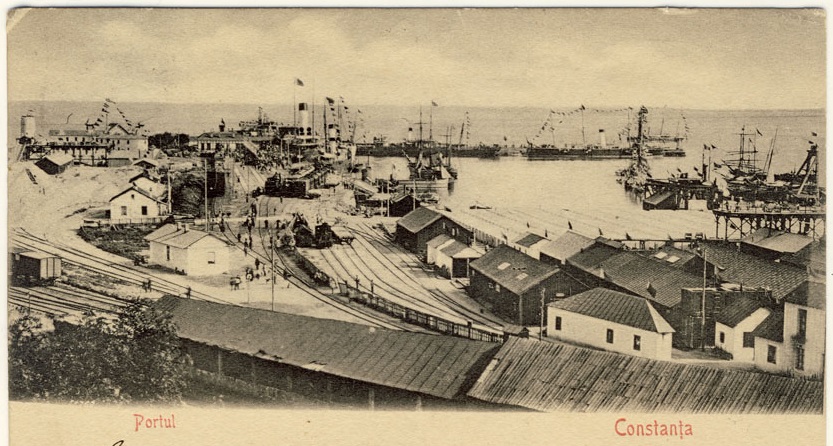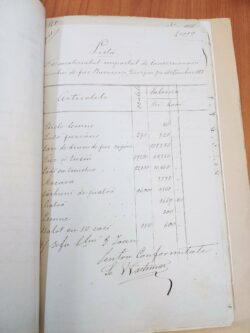CanCor
Research ProgramsColonial Anxieties, Corruption Scandals and Xenophobia in Nineteenth-Century Infrastructure Development in Romania
Colonial Anxieties, Corruption Scandals and Xenophobia in Nineteenth-Century Infrastructure Development in Romania

Exploratory Research (PN-III-P4-PCE-2021-0399)
Timeframe:
June 2022 – December 2024
Team:
Project Leader:
Silvia MARTON, PhD, Associate Professor, Faculty of Political Science, University of Bucharest
Experienced Researcher:
Toader POPESCU, PhD, Assistant Professor, “Ion Mincu” University of Architecture and Urbanism, Bucharest
Constantin ARDELEANU, PhD, Professor, The “Lower Danube” University of Galați / Institute for South-East European History, Bucharest
Postdoctoral Researchers:
Raul CÂRSTOCEA, PhD, Lecturer in Twentieth-Century European History, Department of History, Maynooth University, Ireland
Andrei-Dan SORESCU, PhD, Researcher
Website:
https://cancor.nec.ro/2022-2/

Photo source: The National Library of Romania
CanCor examines the surprising historical relevance of rail and fluvial-maritime transportation infrastructure for the self-imaginings of nation-building and the narratives of modernization in the Romanian Principalities/Romania, from the 1840s to 1914. Given the dual nature of such transportation infrastructures, imagined as both “progressive” and “disruptive”, their construction brought immense pressure upon local decision-makers. The project has three main goals: First, it will examine anxieties over the possibility that the Principalities/Romania would be subject to economic and even demographic colonization, fears generated by the asymmetrical political and economic interactions with Europe’s Great Powers and neighbouring empires. Second, it will examine the corruption scandals surrounding infrastructure construction that generated and constantly reshaped colonial anxieties in the process of nation-state-building, when faced with Great Powers and their imperial and colonial-like aspirations of political and economic influence. Third, the project will historicize the semantic usages of “colonialism” and “corruption” and their inherently political uses in nation-building in Romania and in the process of infrastructure construction, arguing that, on both accounts, reflexively situating their meanings is necessary as a way of disentangling them from the ex-post analytical vocabulary normatively employed by (contemporary) scholars.
- Concurs pentru un post de cercetător în cadrul proiectului „Anxietăți coloniale, scandaluri de corupție și xenofobie în dezvoltarea infrastructurii în România (secolul al XIX-lea) (CanCor)”
Pre-selection results (September 2023)
Pre-selection interview results
Final results
Events:
-International Conference:
Transportation Infrastructure, (Anti)Corruption, and Power Relations in the Nineteenth and Twentieth Centuries
13-14 May 2024
-Workshop on method:
Colonial Anxieties, Corruption Scandals and Modernization in Nineteenth-Century Infrastructure Development
19-20 October 2023, New Europe College, Bucharest
Conveners: Silvia Marton and Andrei-Dan Sorescu

Photo: List of rolling stock imported by the concessionaires for the Bucharest-Giurgiu railway, October 1868 (National Archives of Romania, Ministry of Public Works, inv. 1304, dosar 26/1868, f. 5).
The workshop aims to focus on major methodological questions pertaining to the study of infrastructure, with a special focus on the construction of rail and fluvial-maritime transportation infrastructure in Central-South-East Europe (from the early nineteenth century to present day). It explores three interrelated directions. First, transportation infrastructure’s both phenomenological and performative nature. Discussions include here, but are not limited to, ‘progressive’, ‘disruptive’, ‘dangerous’, if not overtly ‘colonial’ characteristics of transportation infrastructure; controversies over financial and human capital and technology transfers; debates on paths and rhythms of infrastructure-boosted ‘modernization’. Second, the workshop will also inquire into the fears generated by the asymmetrical political, financial and economic interactions between Central-South-East Europe’s (emerging) polities and Europe’s Great Powers and empires in the process of transportation infrastructure construction. It will discuss methodological difficulties related to the study of the entanglements of economic nationalism with civilization-discourses and xenophobia; fears of economic ‘vassalage’ or ‘colonization’; colonial-like aspirations of political and economic influence; (in)formal dependencies or occupations. Last but not the least, the workshop’s methodological inquires include the relevance of corruption debates and scandals surrounding infrastructure construction that generated and constantly reshaped ‘colonial’ anxieties. Moreover, the workshop looks into the many ways ‘corruption’ as an idea and discourse, as well as a practice, played an important role in the history of modern politics and state- and nation-building processes.
Emphasis will be on the limits, nuances, and contested meanings, and the historical layers of main concepts – such as ‘colonialism’, ‘corruption’, ‘modernization’, ‘infrastructure’, ‘informal empire’, ‘soft colonialism’ – generated by the debates and scandals surrounding transportation infrastructure construction, and technological development in the process of nation- and state-building in Central-South-East Europe.
-Conferința de lansare/ Launch Conference:
Infrastructură de transport și națiune. Discursuri și scandaluri ale modernizării în România (1840-1914) / Transportation infrastructure and nation-building. Discourses and scandals of modernization in Romania (1840-1914)
18 noiembrie 2022, Colegiul Noua Europă
Publications:
-Silvia Marton, “Hopeless Corruption? Negotiating modernity in Wallachia and Moldavia in the 1830s”, in Ricard Torra-Prat, Joan Pubill-Brugues, Arndt Brendecke (eds.), Corruption, Anti-Corruption, Vigilance, and State Building from Early to Late Modern Times, Routledge, 2024, p. 251-267.
-Andrei Dan Sorescu and Raul Cârstocea, “The (Great) Numbers Game: Demographic Anxieties and Quotas in Nineteenth and Twentieth Century Romania and the Global Antisemitic Imaginary,” in Michael Miller and Judith Szapor (eds.), Quotas: The “Jewish Question” and Higher Education in Central Europe and Beyond (1880-1945), New York: Berghahn Books, 2024, p. 67-108.
-Constantin Ardeleanu, “Commercial and political needs demand the establishment of a Black Sea port”: Infrastructure development, opportunities and anxieties in an Eastern European periphery (1860s–1870s),” The Journal of Transport History, 0(0), 2023. https://doi.org/10.1177/00225266231180284
-Raul Cârstocea, “The Unbearable Virtues of Backwardness: Mircea Eliade’s Conceptualisation of Colonialism and His Attraction to Romania’s Interwar Fascist Movement”, in Siegfried Huigen, Dorota Kołodziejczyk, East Central Europe Between the Colonial and the Postcolonial in the Twentieth Century, Palgrave Macmillan Cham, (April) 2023, p. 113-140.